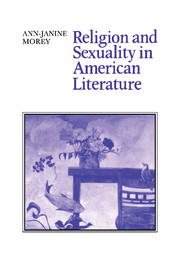Book contents
- Frontmatter
- Contents
- Acknowledgments
- Introduction
- 1 Body Language: Religion, Sexuality, and the Bioluminescence of Metaphor
- 2 The Stubborn Density of Desire: Religion and Sexuality in Nineteenth-Century Fiction
- 3 A Tradition of Divine Lechery: Men Write about the Ministry
- 4 A War of Words: Women Write about the Ministry. The Homiletic writers
- 5 Comfort to the Enemy: Women Write about the Ministry. The Parsonage Romance
- 6 The Fox in the Well: Metaphors of Embodiment in the Androcentric Imagination
- 7 Fatal Abstractions: Metaphors of Embodiment in the Gynocentric Imagination
- 8 Conclusion: Words Are Not the Thing Itself
- Appendix A The Homiletic Novels and Their Authors
- Appendix B The Parsonage Romances and Their Authors
- Bibliography
- Index
- Cambridge Studies in American Literature and Culture
8 - Conclusion: Words Are Not the Thing Itself
Published online by Cambridge University Press: 25 March 2010
- Frontmatter
- Contents
- Acknowledgments
- Introduction
- 1 Body Language: Religion, Sexuality, and the Bioluminescence of Metaphor
- 2 The Stubborn Density of Desire: Religion and Sexuality in Nineteenth-Century Fiction
- 3 A Tradition of Divine Lechery: Men Write about the Ministry
- 4 A War of Words: Women Write about the Ministry. The Homiletic writers
- 5 Comfort to the Enemy: Women Write about the Ministry. The Parsonage Romance
- 6 The Fox in the Well: Metaphors of Embodiment in the Androcentric Imagination
- 7 Fatal Abstractions: Metaphors of Embodiment in the Gynocentric Imagination
- 8 Conclusion: Words Are Not the Thing Itself
- Appendix A The Homiletic Novels and Their Authors
- Appendix B The Parsonage Romances and Their Authors
- Bibliography
- Index
- Cambridge Studies in American Literature and Culture
Summary
At the conclusion of Ellen Glasgow's Vein of Iron, the dying philosopher, John Fincastle, is granted the same vision with which Surfacing's narrator restores her dead father to organic humanity. Struggling homeward, Fincastle finds “the world had worn so thin he could see through it.” What he sees are all the fragments of remembered reality, floating and rolling “like an ocean of space… all a part of the running waves… The world and life were all one.” Like the father in Surfacing, who, “after the failure of logic” wants the border abolished, “wants the forest to flow back into the places his mind cleared,” Fincastle relinquishes his dedication to the rational, objectified view of the world, answering a “faculty deeper, stronger, wiser than the power he had called reason.”
Julia Bader notes the same kind of disruption of “reality” in the writing of Sarah Ornejewett, Mary Wilkins Freeman, Charlotte Perkins Gilman, and other nineteenth-century American women writers. She says that in these writers, “the narrative pauses to suggest that an external reality hitherto objectively perceived and transparently visible can blur and dissolve, that the firm, knowable texture of the familiar world can be shaken and lost,” and she goes on to suggest that this quality of writing – a quality that we have seen at a number of points in the works discussed in Chapters 4 and 7 – serves as a commentary on the “process and hazards of female perception and self-perception.”
- Type
- Chapter
- Information
- Religion and Sexuality in American Literature , pp. 236 - 246Publisher: Cambridge University PressPrint publication year: 1992



